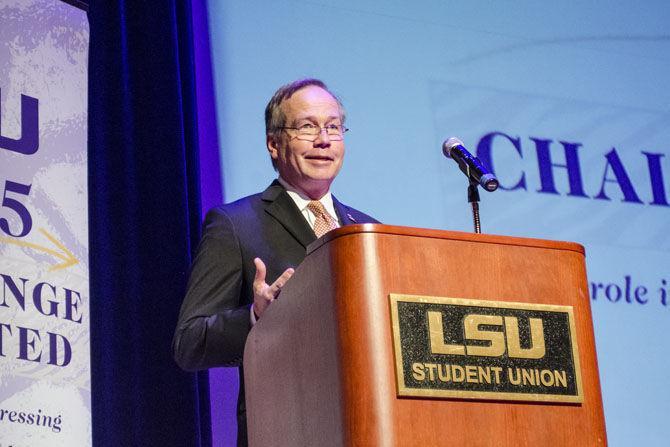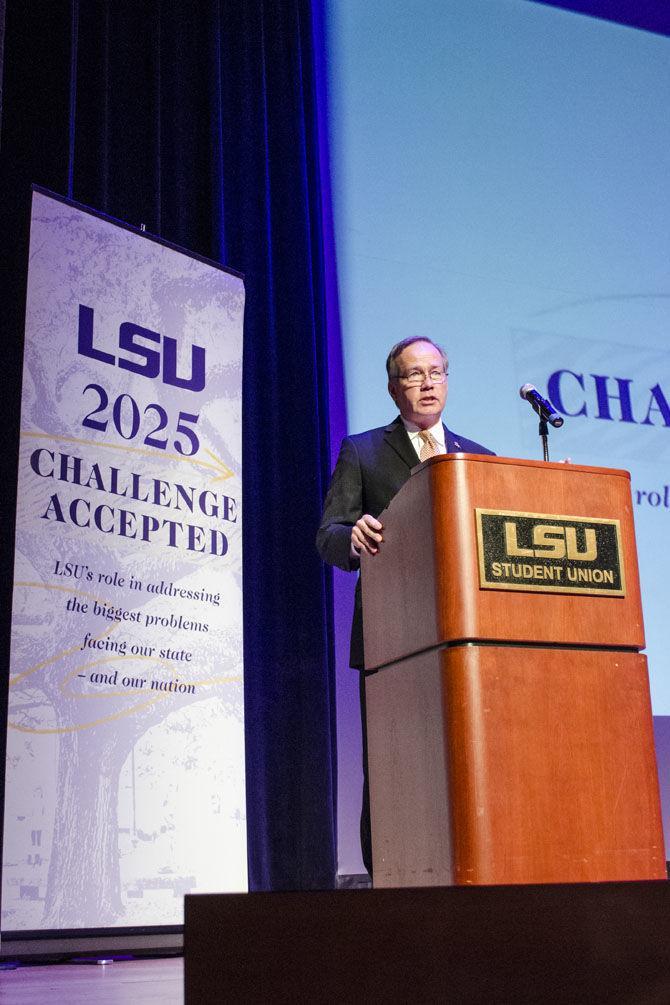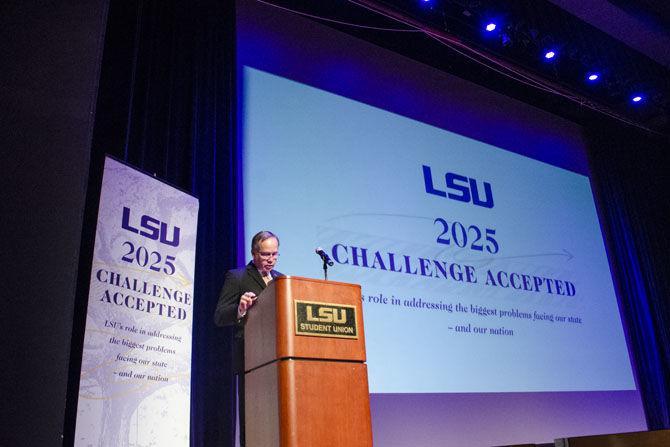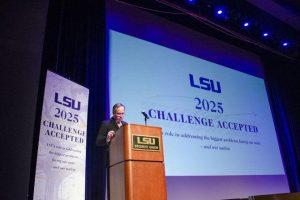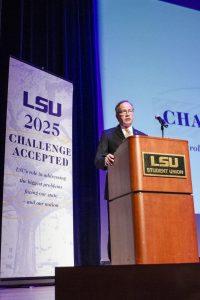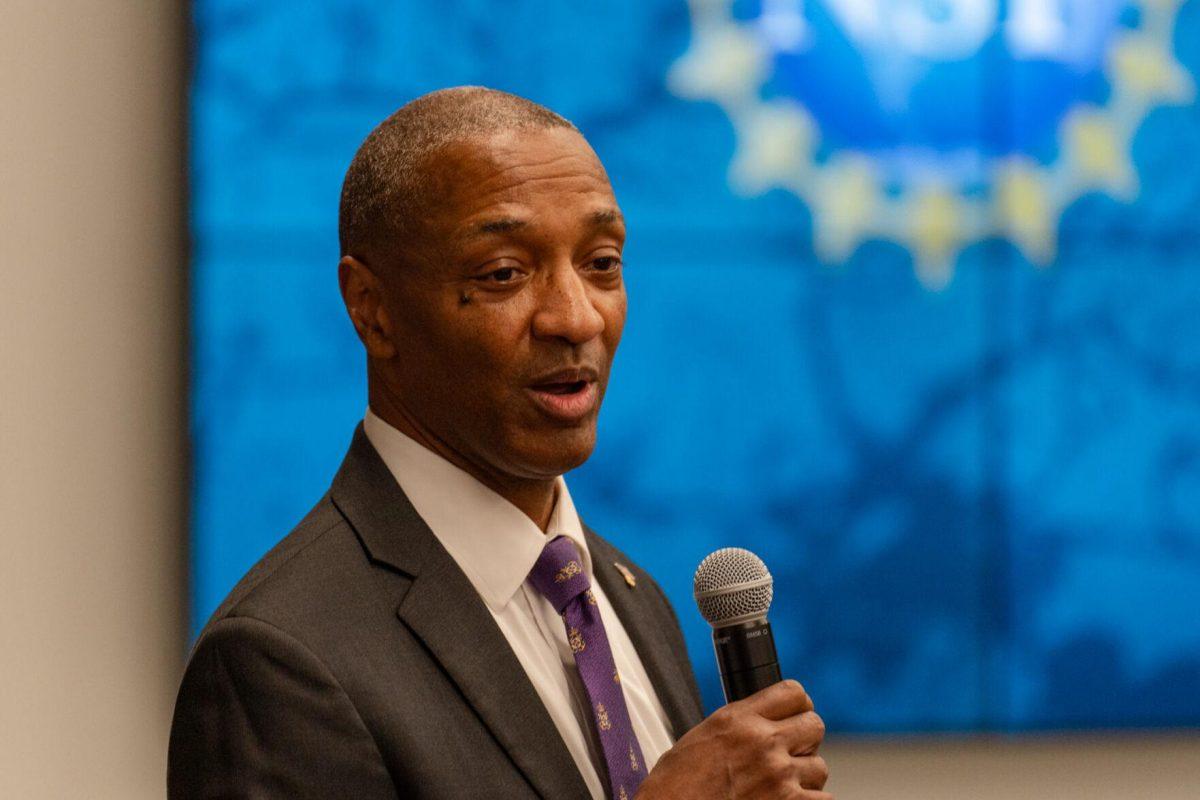LSU President F. King Alexander addressed the University on Feb. 16 to demonstrate LSU’s ability to tackle issues faced by Louisiana and the nation.
The address marked the final event of LSU 2025: Challenge Accepted, where Alexander visited all seven campus locations across Louisiana, culminating with his address in the Student Union Theater Friday morning.
Alexander outlined six critical areas for the University to address: enhancing arts and culture, protecting the coast, fostering greater research and economic development, improving the state’s health and well-being, transforming education and developing leaders.
“LSU is recommitting to its land grant mission of research, education and service for the benefit of our state,” said Alexander in his address. “The entire LSU family has a responsibility to help Louisiana, with each campus playing a distinct and vital role. The mantle of finding solutions to the state’s most pressing problems is upon our shoulders.”
As the flagship university of Louisiana, Alexander touted about the collective power of LSU as a land-sea-and-space grant university. Land-sea-and-space grant universities solve problems the nation faces, preserve the country and state’s coastline and build rockets for the future, according to Alexander.
Alexander cited a study released on Feb. 5 by the Economics and Policy Research Group at the E. J. Ourso College of Business stating the University’s total economic impact to Louisiana is $5.1 billion, which equates to $1,097 per Louisiana citizen. The study excluded the economic impact of the athletic department and focused on the University’s roles of a job creator and bringer of outside talent and business.
“We could be the most important economic engine in the state because we are here to stay,” Alexander said in his address.
Throughout the speech, Alexander gave various statistics to highlight the issues faced by Louisiana. Louisiana loses a football field of coast every hour. Cancer mortality rates are 15% higher in Louisiana than the national average. Louisiana ranks 49th in the nation in total opportunity.
Despite the pressing challenges, President Alexander remained steadfast in his belief that the University could tackles these issues. According to Alexander, the LSU AgCenter has educated more than 600,000 students interested in restoring Louisiana’s marshland since 2007. The University is also the state’s largest producer in medical professionals, and home to Louisiana’s only dental school.
“I think the issues are so much interrelated,” Alexander said. “You can’t say just say we are going to fix health. Health is related to education. Health is related to economic development and economic impact. Education is related to economic impact and related to health. It’s hard to differentiate. You need leaders to see these as problems and make sure their companies are addressing it and not just looking after their profits.”
When looking at national issues, Alexander focused on the nation’s economic inequality and lack of social mobility that has been rising since the 1980s. He referred to higher education multiple times as the “guardians of social mobility.” LSU is 14th out of the nation’s 50 flagship universities in social mobility.
“Everything we do is to make sure social mobility is alive and well in this country,” Alexander said in his address.
Alexander discussed the state’s current budgetary issues as well, criticizing the legislature’s cuts to public education spending over the last decade and urging state leaders to solve the problem now instead of in June. He said last year’s decrease in TOPS spending cost the main University campus potential freshman and staff members.
“The whole dialogue on the issues Louisiana faces where we are 49th, 48th or 47th, I don’t hear enough of,” Alexander said. “I don’t hear this factored in to the strategies that address these issues. It’s more about what’s in our budget and not realizing that we can do better.”



